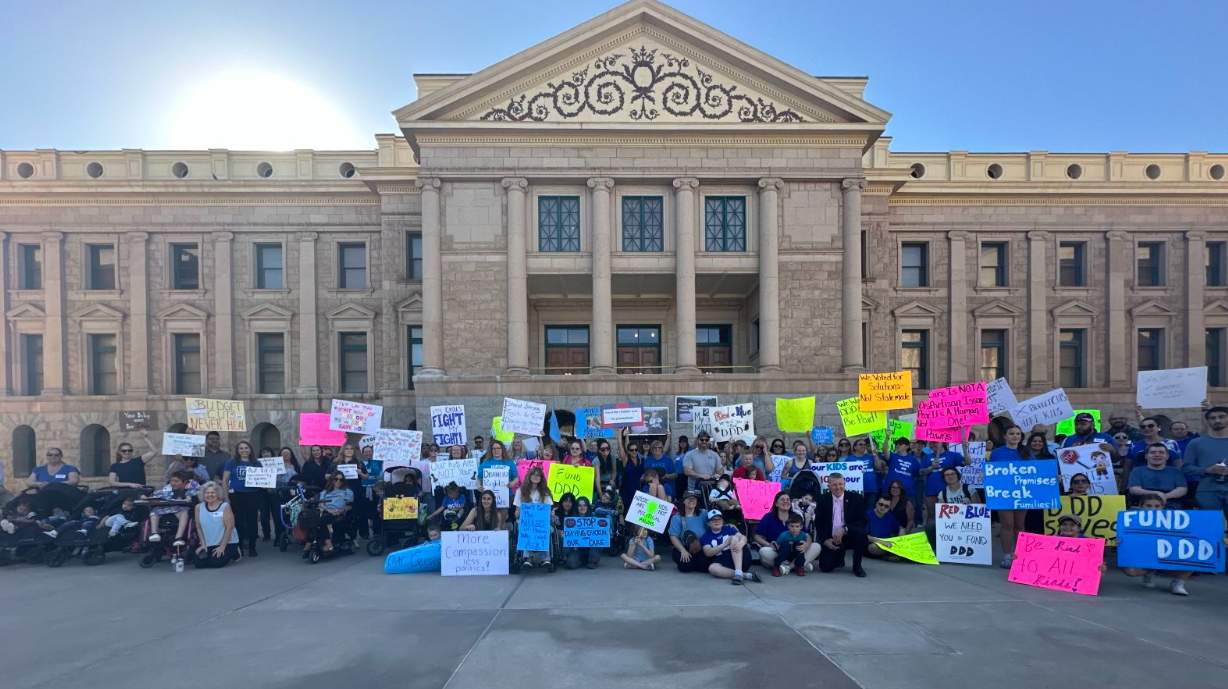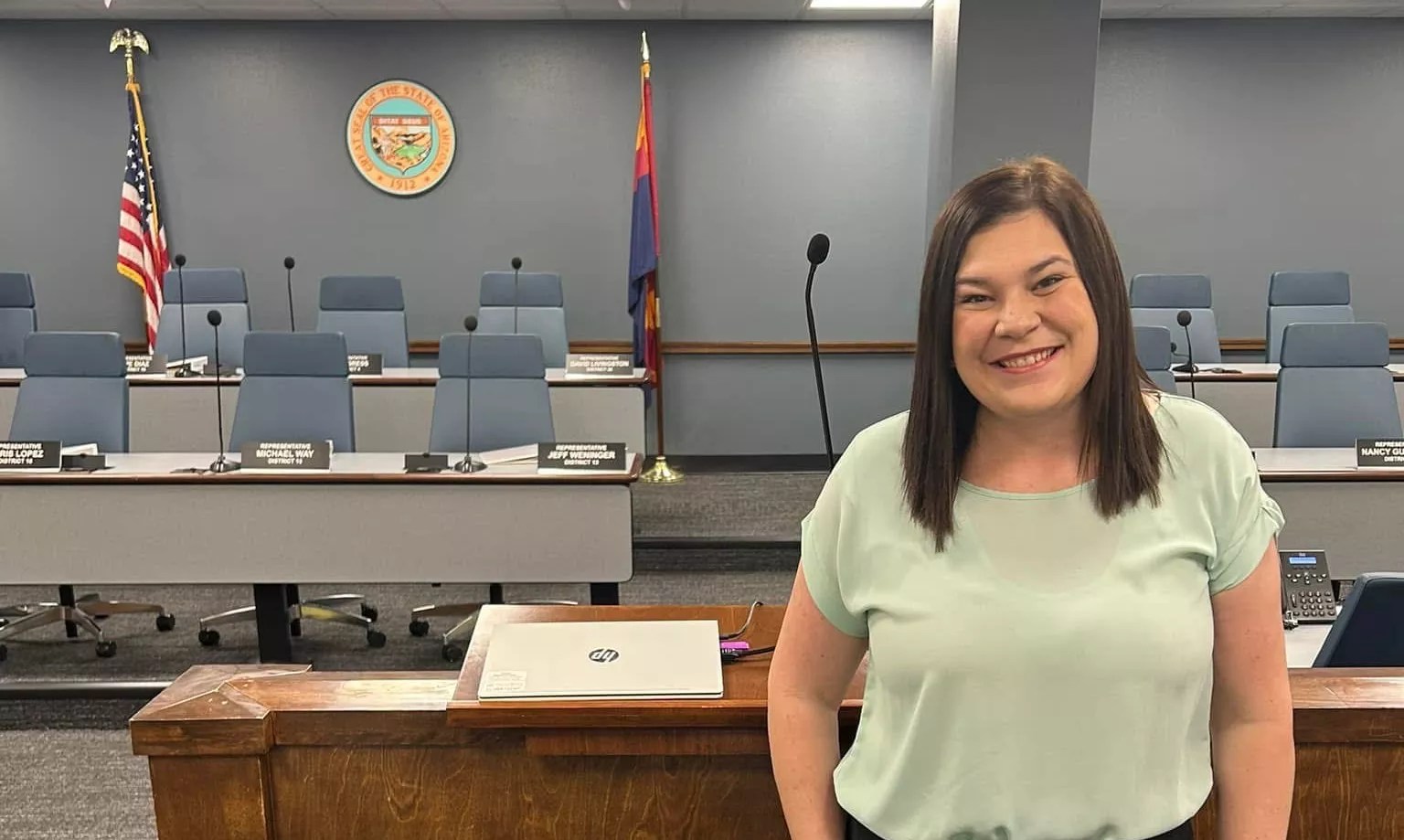
Courtesy of Michele Thorne

Audio By Carbonatix
With a stroke of a pen on Thursday afternoon, Gov. Katie Hobbs allowed 60,000 families to exhale.
Hobbs signed a bill that steered a crucial government agency away from a fiscal cliff. Entering the year, Arizona’s Division of Developmental Disabilities was short $122 million, with money set to run out May 1. Without an infusion of funds, many Arizona families – particularly those that benefit from the Parents as Paid Caregivers program, which pays parents up to 40 hours a week to care for their severely disabled children – would have been left in the lurch.
Instead, after months of sniping, Hobbs and Republicans in the Arizona House of Representatives struck an 11th-hour compromise Wednesday night to fund the program through June 30.
Families who depend on the DDD and the PPCG program felt they had been given a reprieve.
“The community, for the first time since Jan. 29, has been able to take a deep breath today,” said Michele Thorne, the co-founder and CEO of caregivers’ advocacy group Care 4 the Caregivers. “I totally broke down. I was so happy that these caregivers can now take a breath and see the light at the end of the tunnel.”
Affected parents were hardly optimistic that the legislature would get its act together. Some, like 30-year-old Gilbert mom Alexandra Patterson, were considering moving out of state if a compromise wasn’t reached. Others had to think about institutionalizing their kids.
An initial Republican proposal to pay parents only up to 20 hours a week would have forced their hand. Their kids need round-the-clock care, and Arizona lacks enough medical professionals to make up the difference. That’s why the PPCG program was started in the first place.
“We’re very limited on where we can live with our children. We’re limited on doctors for our children,” said Bridget Ekmalin, who cares for six adopted and foster kids who rely on DDD services.
Recent legislative maneuvering gave parents little hope. Last week, Republicans stacked a House committee with extra members to defeat a bipartisan proposal that would have blunted some of the cuts sought by Republican Reps. David Livingston and Matt Gress. Several parents who rely on DDD watched that political gamesmanship happen in person at the Capitol.
Even Wednesday afternoon, with the funding deadline a week away, prospects looked grim. Lawmakers could not agree on a solution, shooting down a restrictive bill that Hobbs vowed to veto anyway. But after four hours of closed-door negotiations Wednesday evening – led by Democratic Rep. Nancy Gutierrez and Republican Rep. Julie Willoughby – lawmakers reached a deal, passing a bill that doesn’t cut parent pay while also instituting more oversight.
On Thursday morning, the bill passed nearly unanimously through the Arizona Senate without amendments, landing it on Hobbs’ desk by mid-afternoon.

Brandi Coon uses the Parents as Paid Caregivers program to care for her 10-year-old son with cerebral palsy.
Courtesy of Brandi Coon
‘A miracle’
To Brandi Coon, the co-founder of the Raising Voices Coalition, which advocates for the PPCG program, the Wednesday night bargain was “a miracle.” She and Thorne, who uses the PPCG program to care for her 12-year-old autistic son, said Gutierrez and Willoughby deserved credit for hashing out a solution.
Thorne said the two lawmakers’ “names should be on that bill, let’s get that straight.” The pair “just wanted to make sure that families got the support that they needed. They are examples of what leaders should be.”
“It is a really great compromise on both sides,” added Coon, who relies on PPCG to care for her 10-year-old son with cerebral palsy. “It gave the Republicans what they were asking for and doesn’t harm our programs in the DDD community at the same time.”
After the House finally passed the bill Wednesday night, Patterson told New Times that she’s glad lawmakers “kind of opened their eyes” to how a lack of funding would affect so many people. Now, she won’t have to move out of Arizona to care for her son, she said.
“We’re definitely really grateful,” said Patterson, whose 2-year-old son Aries was born with the rare 5Q31.3 deletion syndrome and requires constant care. “I’m just happy that I can keep my son home and his nursing is not going to be affected.”
Now that Hobbs has signed the bill to ensure DDD funding doesn’t run out in seven days, the pressure on DDD families is lifted. She and Republicans still have to negotiate the program’s future in the budget for the next fiscal year and beyond. But that doesn’t figure to be as protracted a battle as the one the two sides just finished.
DDD families appreciate the breather.
“Now that there’s a resolution,” Thorne said, “everybody can just take a deep breath and kind of regroup from the trauma they’ve been through for the past two months.”